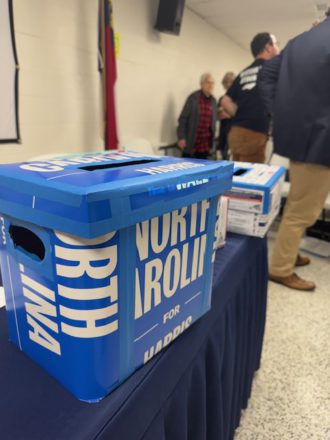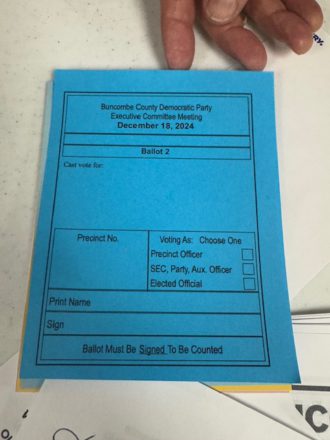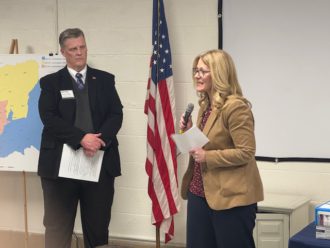In the crowded, fluorescent-lit basement of the Buncombe County Democratic Party headquarters in Oakley on Dec. 18, Democrats conducted the final election of 2024.
After two rounds of voting, Drew Ball emerged from a field of 10 candidates to earn the Democrats’ nomination for the District 3 seat on the Buncombe County Board of Commissioners to replace Amanda Edwards, who was elected chair in the Nov. 5 election. By law, commissioners must approve Ball’s appointment as long as procedures were appropriately followed.
“Our county is at a critical moment. We have serious challenges in economic, environmental, and public health,” Ball said in his final pitch to the room before voting began. “I’m ready to step in and get to work and lead. I’m ready to ensure that every voice is heard, our public schools are solvent and that we get the resources we need to take care of each other and get through this together.”
Ball, who was nominated by N.C. House Rep. Caleb Rudow, District 116, is the Southeast campaigns director for the Natural Resources Defense Council, a board member of the North Carolina Sierra Club and a volunteer firefighter at the Reynolds Volunteer Fire Department.
After Tropical Storm Helene ravaged the region, Ball helped lead recovery efforts, acting as public information officer at the Reynolds Fire Department’s supply depot and helping raise money for disaster relief, he said.
“Like so many folks in our community, I went to where I felt like I was needed most,” he said. “I saw what so many folks in this room saw in our community — putting our differences aside to come together to rush to take care of each other and ensure our strength and our resolve.”

Going forward, Ball cites storm recovery and accessing the state and federal resources Buncombe needs as the most important task facing the commission when he joins in January.
“On the ladder of first response, our first responders, our community members, our churches, our nonprofits stepped in at that first line. Now we need the state to step in,” he added.
Precinct chairs and vice chairs from 32 precincts in District 3, elected officials who represent part or all of District 3 and members of the Democratic Party executive committee all got at least one vote in the proceedings. Precinct chairs and vice chair votes were weighted more heavily based on how many voters in their precinct voted for Gov.-elect Josh Stein.
The condensed campaign produced a flurry of activity, including door-to-door campaigning and in-person meetings. For example, Ball called elected officials, those with and without a vote, to get advice and garner support, as well as meeting with numerous party officials. Candidate Sabrina Delk held a coffee meetup at Johnny’s Barbershop in the Grove Arcade to ask regular voters to petition their precinct chairs to vote for her.
Election night
After each candidate made their case with last-minute speeches, voting began on small ballot cards, picked up by “tally runners” in cardboard boxes and taken upstairs to be counted. While votes were counted, candidates, voters and onlookers mingled in the small basement, eating pizza, drinking soda and talking politics as spiders hung from aging ceiling tiles overhead.

Once votes were tallied, Ball emerged as an early front runner after receiving nearly 40% in the first round. Aaron Sarver, former public information officer for the Buncombe County Sheriff’s Office, and third-place finisher Kevan Frazier, owner of Well Played Board Game Cafe and former city council candidate, were close behind. Sarver was nominated by Sheriff Quentin Miller, and Edwards nominated Frazier. Nominations could be made by anyone eligible to vote in the special election.
There were seven other candidates, including Liza Schillo who threw her hat in the ring the morning of the vote, but was eliminated after receiving no votes in the first round. The rest of the field included: Doug Baughman, a retired water resource scientist; Janet “J” Canfield, a licensed clinical mental health counselor; Delk, the director of the Center for Entrepreneurial Leadership at Mars Hill University; Lauren Edgerton, clinical mental health counselor and elected member of the Woodfin Water and Sewer District Board; Jay Lively, education and career counselor at AB Tech; and Nina Tovish, founder and director of SUSTAINAVL, a nonprofit working to promote the diversification of the region’s economy toward the sustainability sector.
After a second round of voting in which Ball earned more than 49% of the vote, his competitors began to drop out and endorse him. By rule, a candidate needed 50% of the vote plus one to earn the party’s nomination.
After the concessions, executive committee member Keith Thompson made a motion to elect Ball by acclamation for the position without a third round of voting.
“We basically elected our candidate by unanimous vote,” Kristen Robinson, first vice chair of the county party, told Xpress after the meeting. “Acclamation was really the best way for this to happen.”
Unbalanced commission
The candidates ran abbreviated 10-day campaigns because it took party leaders several weeks to determine from which area they would be seeking candidates. District lines, dictated by the N.C. General Assembly, have changed three times since 2020. Parties typically have 30 days to fill a vacancy on the board, according to state law.
“It was a sprint,” Ball said after winning the election.
According to party leadership, despite living in northern Buncombe County, Edwards represented District 3 after district lines changed in 2023 when the N.C. General Assembly drew new maps. District 3 currently encompasses central Buncombe County, including much of the City of Asheville, Woodfin and Biltmore Forest.

“Unfortunately, the confusion that has arisen is a direct result of the misguided and repeated gerrymandering forced on Buncombe County by the legislature in Raleigh,” Democratic Party Chair Kathie Kline told Xpress from Mexico before the meeting.
Kline said party leadership consulted its attorney, the North Carolina Democratic Party’s attorney, and counsel with the UNC School of Government to determine that Edwards’ replacement should come from the current District 3, rather than the District 3 that Edwards was initially elected to represent in the northern part of the county in 2022.
The result will be a geographically unbalanced county commission. Since 2011, there have been two representatives from each of the county’s three districts and a chair, elected at-large countywide. In January, three commissioners will reside in the centrally located District 3, two in the southern and eastern District 1 and just one — Terri Wells — in the northern and western District 2. Edwards resides in District 1, but represents the county at-large as Chair.
Chris Cooper, professor of political science and public affairs at Western Carolina University, said residents in the northern end of Buncombe County should feel slighted.
“The whole point of a district system, as opposed to an at-large system, is to make sure that you have representation based on geography. And plenty of places don’t do that. Plenty of places have at-large districts, but that’s not the system we have. What we’re left with is the problems of a district system without the representational benefits,” he said.
Buncombe is one of 61 counties in the state — out of 100 — that uses some form of a district-based system for its county commission, according to the North Carolina Association of County Commissioners.
A ‘hot mess’
Democrats argue that the 2023 maps upended district representation.
“While the legislature gerrymandered each of those member’s districts to change their constituencies, there was not a change in the district number each commissioner represented. Each member was elected to represent a specific district (1, 2, or 3) and continues to represent that district, regardless of where the district lines are located,” Kline said.
For example, Commissioner Martin Moore, elected in 2022 to represent the then-South Buncombe District 2, represents the new North Buncombe District 2 under the 2023 maps. Likewise, Commissioner Al Whitesides, elected to represent District 1 in 2022, now lives in District 3.

Cooper argues that as he reads the law, the party should have nominated someone who lives in Edwards’ part of the county in order to ensure representation. But, he added, there is a justification to the way the county Democrats interpreted the law.
State Rep. Tim Moffitt, who represented Buncombe in 2011 when he introduced the bill tying commissioner districts to House districts, told Xpress at the time that he hoped the law would ensure more widespread representation in more rural parts of the county and make running grassroots campaigns easier. Moffitt now represents Henderson County.
Kline said politics, not equal representation, motivated the change.
“I believe that these districts were specifically created by Tim Moffit and state Republican leaders in 2011 to gerrymander Republicans onto the County Commission because local Republicans weren’t winning elections. The repeated redistricting by the Raleigh Republicans is designed to cause confusion and prevent current Democratic commissioners from running for reelection by drawing them out of their districts. These districts are about political power, not good governance,” Kline said.
Another complication of the Democrats electing someone from District 3 to replace Edwards is what happens in 2026, when the seat is up for reelection. Ball could possibly have to run against longtime incumbent Whitesides in a Democratic primary that year. Commissioner Parker Sloan, the party’s other District 3 representative who actually lives in the district, isn’t up for reelection until 2028. Meanwhile, there will be no incumbent for District 2 in 2026, since Moore lives in South Asheville.
One thing is certain. The frequent redistricting is confusing.
“It’s a hot mess,” Cooper said.




Before you comment
The comments section is here to provide a platform for civil dialogue on the issues we face together as a local community. Xpress is committed to offering this platform for all voices, but when the tone of the discussion gets nasty or strays off topic, we believe many people choose not to participate. Xpress editors are determined to moderate comments to ensure a constructive interchange is maintained. All comments judged not to be in keeping with the spirit of civil discourse will be removed and repeat violators will be banned. See here for our terms of service. Thank you for being part of this effort to promote respectful discussion.